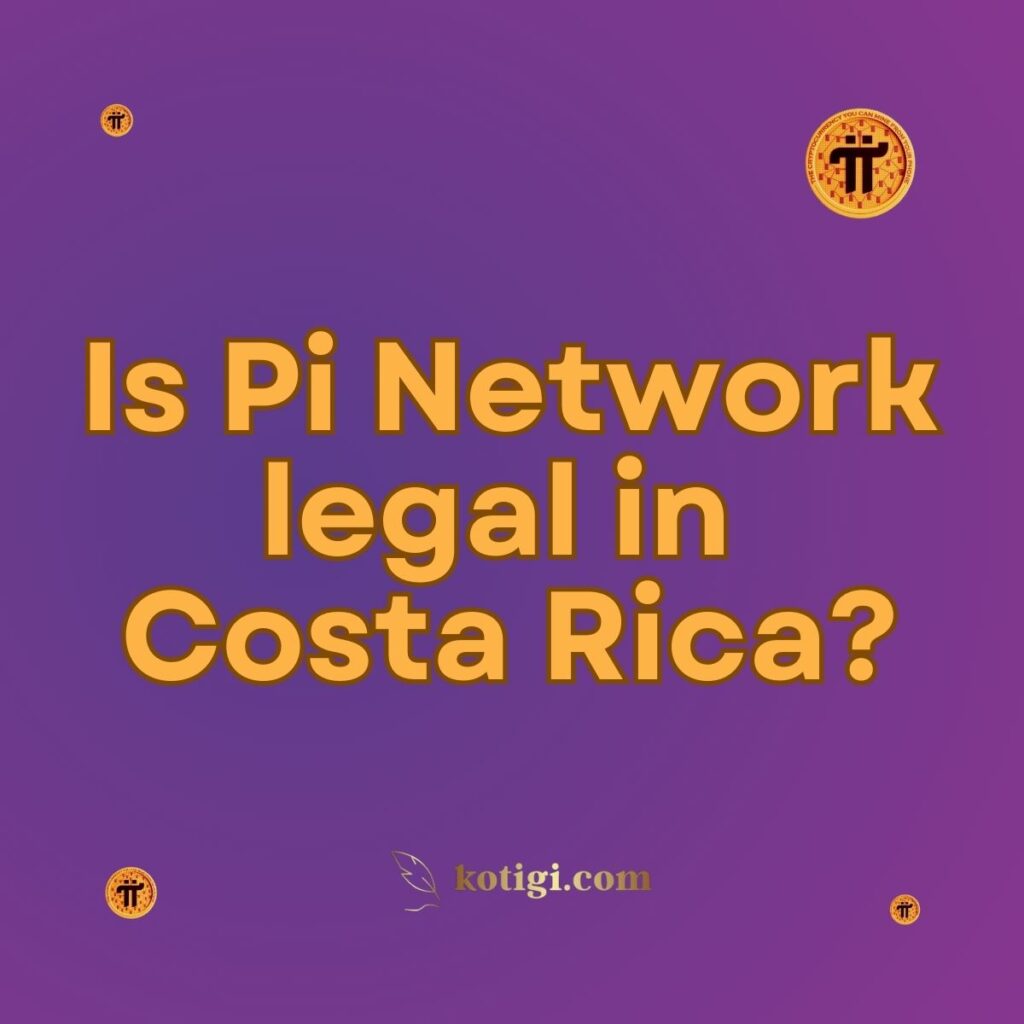
Is Pi Network legal in Costa Rica?
Pi Network operates in a generally favorable legal environment in Costa Rica, as the country has not placed significant restrictions on the use of cryptocurrencies. Although Costa Rica does not officially recognize cryptocurrencies as legal tender, it allows their use and trading. Costa Rican Pi Network users can participate in mining and transactions with minimal legal risks, provided they follow the country’s financial regulations.
Introduction
As cryptocurrency adoption spreads across the globe, countries have developed different legal frameworks to regulate their use. In Costa Rica, cryptocurrencies such as Bitcoin, Ethereum, and potentially Pi, have a relatively open legal status. Although they are not officially recognized as legal tender, Costa Rican law permits the use of cryptocurrencies, and citizens can trade, mine, and transact with them under specific guidelines. This favorable stance towards digital assets means that platforms like Pi Network can operate with fewer legal concerns in the country.
1. Overview of Costa Rica’s Cryptocurrency Regulations
Costa Rica does not have specific laws that either fully regulate or ban cryptocurrencies. However, the country has adopted a somewhat neutral stance, allowing their use and trading while providing limited regulatory oversight. This legal environment enables Pi Network users to mine and participate in the ecosystem with little interference from the government.
1.1 Legal Status of Cryptocurrencies in Costa Rica
Costa Rica does not recognize cryptocurrencies as official currency, meaning they are not considered legal tender. This, however, does not prohibit their use. Cryptocurrencies are classified as an asset or property, which means Costa Ricans can trade or hold them as long as they comply with financial regulations, such as anti-money laundering (AML) laws.
1.2 Absence of Specific Cryptocurrency Regulations
Currently, Costa Rica does not have a dedicated legal framework to govern cryptocurrencies. This lack of specific regulation has allowed cryptocurrency users to freely engage in transactions, although the government has advised caution regarding the potential risks, such as fraud or loss due to market volatility.
1.3 Role of the Central Bank of Costa Rica
The Central Bank of Costa Rica has issued several statements clarifying that cryptocurrencies like Pi and others are not backed by the national financial system. This means that while citizens can use cryptocurrencies, they do so at their own risk, and losses are not insured by the government. Despite this, there are no legal restrictions preventing users from mining Pi coins or using them for peer-to-peer transactions.
2. Pi Network’s Legal Standing in Costa Rica
Given the country’s open stance on cryptocurrency use, Pi Network has the opportunity to expand its presence in Costa Rica without facing significant legal challenges. While the platform’s operations are not directly regulated by Costa Rican authorities, Pi Network users are subject to the same rules that apply to other cryptocurrencies.
2.1 Lack of Direct Regulation on Pi Network
Since Costa Rica has no specific legal framework governing Pi Network or other cryptocurrencies, Pi operates in a relatively free environment. Users are able to mine Pi without concerns about breaking any specific cryptocurrency laws. However, the absence of regulation also means that users need to be cautious about potential risks, such as scams or unregulated exchanges.
2.2 Compliance with Financial Regulations
Although Pi Network is not regulated, users must still comply with the country’s existing financial regulations, especially when converting Pi coins into local currency. For example, individuals must adhere to Costa Rica’s anti-money laundering (AML) and counter-terrorism financing (CTF) laws when engaging in cryptocurrency transactions. This ensures that Pi Network users avoid any legal issues related to illicit financial activities.
2.3 Tax Implications for Pi Network Users
While Costa Rica does not have specific tax laws for cryptocurrencies, any income derived from Pi coins, such as profits from trading or selling Pi, could be subject to income tax. Costa Rican tax authorities may require users to report any gains made from cryptocurrency transactions, just as they would with any other form of income.
3. Opportunities and Challenges for Pi Network in Costa Rica
Pi Network’s presence in Costa Rica offers both opportunities and challenges, as the country’s cryptocurrency landscape continues to evolve. The platform can take advantage of the country’s generally open approach, but it must also navigate the challenges of a market that lacks formal regulations.
3.1 Growing Cryptocurrency Adoption
Cryptocurrency adoption in Costa Rica is steadily increasing, with a growing number of businesses and individuals using digital assets for payments and transactions. Pi Network’s mobile-first, low-energy mining process makes it an attractive option for users who are interested in exploring alternative cryptocurrencies. As awareness of Pi Network grows, the platform has the potential to expand its user base in the country.
3.2 Lack of Formal Regulation
One challenge for Pi Network in Costa Rica is the lack of formal regulation, which creates uncertainty for users and businesses. While the absence of strict rules allows Pi Network to operate freely, it also means that there is little legal protection for users. In the event of fraud or disputes, users may have limited recourse through the country’s legal system.
3.3 Opportunities for Financial Inclusion
Pi Network’s accessible mining model can help promote financial inclusion in Costa Rica, particularly for individuals who are unbanked or underbanked. The platform’s low barrier to entry allows users to participate in the cryptocurrency space without the need for expensive hardware or high energy costs. This could be especially beneficial in rural areas, where access to traditional financial services is limited.
4. Government Views on Cryptocurrency Risks
While Costa Rica allows the use of cryptocurrencies, the government has been cautious in its approach to regulation, focusing on protecting citizens from potential risks associated with digital assets.
4.1 Concerns About Volatility
One of the main concerns expressed by Costa Rican authorities is the high volatility of cryptocurrencies, which can result in significant financial losses for users. Pi Network, although not yet tradable on the open market, could face similar scrutiny as its development progresses and Pi coins gain monetary value.
4.2 Potential for Fraud and Scams
The Costa Rican government has also warned users about the risks of fraud and scams in the cryptocurrency space. With the growing popularity of platforms like Pi Network, users must remain vigilant and ensure they are engaging with legitimate sources when trading or using Pi coins. This includes being cautious of unregulated exchanges or fraudulent actors posing as Pi Network representatives.
4.3 Lack of Consumer Protection
Another concern is the lack of consumer protection for cryptocurrency users. Since Pi Network operates outside of the traditional financial system, users who experience losses or fraud may have limited legal recourse. This could be a challenge for Pi Network as it seeks to build trust among its users in Costa Rica.
5. Future of Cryptocurrency Regulation in Costa Rica
As cryptocurrency adoption continues to grow, Costa Rica may eventually introduce more comprehensive regulations to govern digital assets. This could have implications for Pi Network and its users in the country.
5.1 Potential for Regulatory Reforms
Given the increasing popularity of cryptocurrencies in Costa Rica, there is a possibility that the government may introduce regulatory reforms to better manage the sector. These reforms could include guidelines for exchanges, taxation, and consumer protection, which would provide more clarity for Pi Network users and businesses looking to accept Pi coins as payment.
5.2 International Influence on Local Regulations
Costa Rica’s approach to cryptocurrency regulation could be influenced by international trends and recommendations from global financial bodies such as the Financial Action Task Force (FATF). As more countries around the world implement cryptocurrency regulations, Costa Rica may follow suit, particularly in areas related to anti-money laundering and financial transparency.
5.3 Impact on Pi Network’s Operations
If Costa Rica introduces more comprehensive cryptocurrency regulations, Pi Network may need to adjust its operations to comply with local laws. This could include registering with financial authorities, implementing know-your-customer (KYC) procedures, or ensuring that Pi transactions meet specific legal standards.
6. Recommendations for Pi Network Users in Costa Rica
Given the current legal landscape, Pi Network users in Costa Rica should take certain precautions to ensure they remain compliant with local laws and minimize potential risks.
6.1 Stay Informed About Legal Changes
As the legal framework for cryptocurrencies in Costa Rica continues to evolve, Pi Network users should stay informed about any changes that could affect their participation in the platform. Keeping up to date with local news and government statements can help users navigate the regulatory environment and avoid potential legal issues.
6.2 Use Reputable Exchanges and Wallets
To reduce the risk of fraud or loss, Pi Network users should use reputable exchanges and wallets for storing and trading Pi coins once they become tradable. This will help protect users from scams and ensure they are engaging with legitimate platforms.
6.3 Report Cryptocurrency Gains for Tax Purposes
Although Costa Rica does not have specific tax laws for cryptocurrencies, users should be prepared to report any gains from Pi Network transactions as part of their regular income. Consulting with a tax professional can help ensure compliance with local tax regulations and avoid potential penalties.
Conclusion
Pi Network operates in a relatively favorable legal environment in Costa Rica, where cryptocurrencies are allowed but not officially recognized as legal tender. While the lack of specific regulations creates some uncertainty, Pi Network users can mine and engage in transactions with minimal legal risk as long as they follow existing financial regulations. As the cryptocurrency landscape continues to evolve, Costa Rican users should stay informed about potential regulatory changes and take precautions to protect themselves from fraud and legal issues.
Key Takeaways
- Costa Rica allows the use and trading of cryptocurrencies, including Pi Network, though they are not recognized as legal tender.
- Pi Network users must comply with existing financial regulations, such as anti-money laundering laws.
- There are no specific regulations governing Pi Network, but users should be aware of the risks associated with fraud and market volatility.
- Future regulatory reforms in Costa Rica could impact the use of Pi Network, requiring the platform and its users to adapt to new legal standards.
- Pi Network users in Costa Rica should stay informed about legal developments and ensure compliance with local tax and financial regulations.





